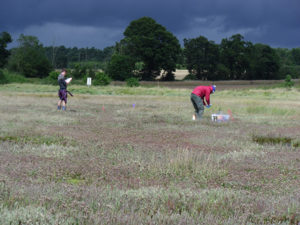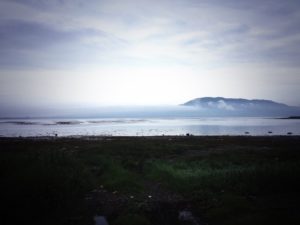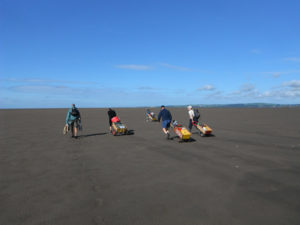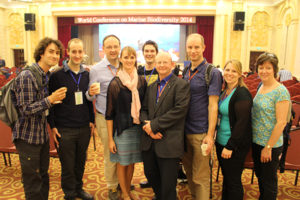As autumn cools the air and our coasts become increasingly wild, wet and windy, CBESS members give a recap of events over the last three months. The collection of CBESS data continues to grow, with more and more samples being processed each day. This is providing the Data Analysis Working Group (DAWG) with an increasingly complex dataset to explore. With Theme 1 (socio-economic and ecological data collection) nearing completion, researchers are beginning to look at Themes 2 and 3: scale effects and context dependency on biodiversity and ecosystem service relationships.
Last week several members of the CBESS team descended on Qingdao, China for the 3rd World Conference on Marine Biodiversity. Click here for further info.
 Kelly Redeker, from the University of York, provides an overview of his research in the Essex marshes, asking the question of whether creating new saltmarshes will help or hinder climate change. Click here for further info.
Kelly Redeker, from the University of York, provides an overview of his research in the Essex marshes, asking the question of whether creating new saltmarshes will help or hinder climate change. Click here for further info.
 CBESS members of the Cambridge Coastal Research Unit, together with a team of researchers from Germany and the Netherlands, have conducted the largest-ever laboratory experiment to investigate how waves are dissipated by coastal salt marshes during storms. Click here for the update by Dr Iris Möller.
CBESS members of the Cambridge Coastal Research Unit, together with a team of researchers from Germany and the Netherlands, have conducted the largest-ever laboratory experiment to investigate how waves are dissipated by coastal salt marshes during storms. Click here for the update by Dr Iris Möller.

The Eddy Covariance team at the University of St Andrews have had a busy summer collecting additional chamber CO2 flux data. Read more here.

The University of St Andrews welcomes a new PhD student to the lab, Ben Taylor, who will be investigating salt marsh restoration and the potential to subsidise such projects through the blue carbon market.
Lydia Bach, of Queen’s University Belfast, provides us with a blog update on lab work and her trips overseas.
Cai Ladd commenced his PhD at the University of Bangor earlier this year, investigating interactions of biological and physical processes on patterns of saltmarsh accretion and erosion. Click here for his non-technical summary and here for first blog instalment.
Cambridge PhD student James Tempest has also provides us with a summary of his research: click here to learn more about his efforts to improve our understanding and quantification of wave and tidal flow reduction caused by saltmarsh vegetation.

Finally, a reminder that applications for our NERC funded advanced training course – Biodiversity & Ecosystem Service Assessment in the Coastal Margin (BESA) – close on 14th November. A more detailed course outline has now been created and can be found on the following link. Please continue to spread the word!

